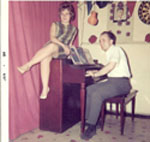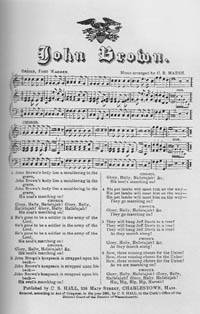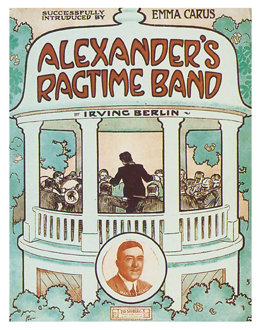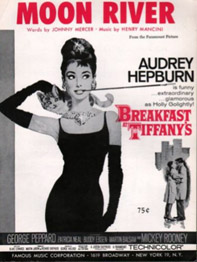

National Carry A Tune Week
October 2 - 8, 2011
This is a free web event sponsored each year
by The Tune Lovers Society
For more information, go to the main page for
Tune Categories
Patriotic Music = 3
Folk Music = 8
Religious Music = 2
Popular Music = 7
Classical Music = 1
Film Music (Songs and Themes) = 6
Total for 2011 = 27 tunes
Total selected from 2001-2011 = 341 tunes
Help support National Carry A Tune Week!
Order any of these items:

"Free As The Breeze"
Confessions of a Struggling Songwriter

"Shake, Rattle and Roll"
Electric Elvis and Bill Randle
![]()
2011 Survey
Thanks to those who participated in this year's survey.
The winner of a Free CD for the best tune comments is:
Craig
![]()
National Carry A Tune Week 2011
Many of the tunes have comments by the Tune Week participants
and
also links to other pages and also to YouTube video clips.
Just click on the links for each tune


"John Brown (or John Brown's Body)" - words and tune by unknown author (first published in 1861).
Comments: This song was first written for a Sergeant John Brown at Fort Warren in Boston, but became better known when verses were written about the more famous John Brown who attacked Harpers Ferry, West Virginia and was hanged for his deeds. This tune was used by Julia Ward Howe for her famous Civil War text: "Battle Hymn of the Republic."
-- Roger
"Down By A New Guinea Waterfall."
Comments: "Down by a New Guinea waterfall, one bright and sunny day, beside his shattered P-38 the young pursuiter lay; his parachute hung from a nearby tree, he was not yet quite dead; so listen to the very last words the young pursuiter said: I'm going to a better land where everything is bright; where whiskey grows on telegraph poles, play poker every night; I won't have a single thing to do but sit around and sing; and all my crews will be women; oh, death where is thy sting!" Now, such a song must be considered in context: young guys flying big twin-engine planes mixing it up during their hundreds of missions with the Japanese in a truly miserable part of the world.The lyrics always seemed to me to be unique; even as a pre-teen back in the 50s it occurred to me that pilots singing about death and the afterlife was, in its own way, very special. It was the release of tension and a particular paean against their fate and the possibility that they could be killed at any time. These were songs with intense meaning to those singing them and they helped these 20 to 25 year old pilots release tension and survive their tours. It seems to me that if you fly 96 missions and acquire 365 combat hours, you're entitled to sing whatever you want!
Comments: My late father was an Army Air Force fighter pilot in WW 2 flying P-38 Lightnings against the Japanese out of New Guinea in 1943-44 and when I and my sisters were mere yutes Dad taught us some patriotic songs as sung by Air Force pilots, including the famous Air Force anthem, "Off We Go Into The Wild Blue Yonder"..."flying high, into the sun; down we go spouting flame from under; at 'em boys, give 'em the gun!" and so on.Thus, these songs, one magnificently obscure, the other well known as the Air Force Song, represent a connection from WW 2 to the next generation - mine - and a transition from the 1940s into the 1950s and they are, to me, both very, very patriotic.
-- Craig

"Blue Moon of Kentucky" - words and music by Bill Monroe (1946).
Comments: On this centennial year of Bill Monroe's birth and in remembrance of my father who was born and raised in Kentucky, this very popular bluegrass song was chosen to pay tribute to Bill Monroe's supreme talent. He is rightly called Father of Bluegrass Music. This song was popular with other singers and was on the first Sun 45 record release by Elvis Presley in 1954, the record that first impressed Cleveland disc jockey, Bill Randle.-- Roger
YouTube - Bill Monroe and the Bluegrass Boys
YouTube - sung by Elvis Presley
"Both Sides, Now' - words and music by Joni Mitchell (1968).
Comments: Dreamy and introspective, the song is associated most often with singer Judy Collins, whose very popular recording has made it a near-standard, sung by many artists. Joni Mitchell performed her own song at a slightly faster tempo, and sold lots of records. Some people mis-name the song's title as "Clouds."--Jim
YouTube - sung by Joni Mitchell
"Eve of Destruction" - words and Music by P.F. Sloan (1965).
Comments: In an era of public protests "Eve of Destruction" was the ultimate protest song, particularly the recording sung by Barry McGuire. Written by a California guitarist, the song holds up and heats up the 1960s despair and anger over nuclear terror, Vietnam, the Cold War, civil rights violations, and other issues. Some radio stations refused to play it because many Americans called it "inflammatory." Recently I saw a televised concert in which Barry McGuire, now age 75, gave a spirited performance of he song. It continues to have power. -- JimYouTube - sung by Barry McGuire
"The Garden Song (Inch By Inch) - words and music by David Mallett (1978).
Comments: There is no garden because there is no sun but we've been doing some work in the backyard trying to transform it into something useful. -- Gail
You Tube - sung by David Mallett
YouTube - sung by Pete Seeger
"The Good Times We Had" - sung by Peter, Paul and Mary.
Comments: "The Good Times We Had" is one of the saddest, most elegiac songs ever written in any genre, a lament of chances and love and times lost. And it brilliantly captures the loneliness of a relationship turned to dust. -- Craig"Joe Hill" - words by Alfred Hayes/ music by Earl Robinson/(1938).
Comments: Soon after 1902, a Swedish immigrant who simplified his name to "Joe Hill" began a dozen years of organizing American workers in some of the toughest industries, including mining in the West. A poet and songwriter as well as a union leader, Hill was famous well before he was executed by the state of Utah in 1915. This song was written about him a quarter-century later and it still is used to inspire powerless workers. The Joan Baez recording of "Joe Hill" is a standard. You are likely to recognize the opening lines:
I dreamed I saw Joe Hill last night,
Alive as you and me.
Says I, "But Joe, you're 10 years dead."
"I never died," says he. -- JimYouTube - sung by Joan Baez
YouTube - sung by Paul Robeson
"Joe Hill's Last Will" - words by Joe Hill in 1915/ music by Ethel Raim in 196l.
Comments: Joe Hill wrote this simple poem on the eve of his execution and handed the paper to someone at the prisonl. It was all but forgotten until Ethel Raim wrote a guitar tune for it decades later. Here is "Joe Hill's Last Will" in its entirety:
My will is easy to decide.
For I have nothing to divide.
My kin don't need to weep and moan,
Moss does not cling to a rolling stone.
My body? -- Oh, if I could choose,
I would to ashes it reduce,
And let the merry breezes blow
My dust to where some flowers grow.
Perhaps some fading flower then
Would soon rise up and grow green again.
This is my last and final will.
Good luck to all of you,
Joe Hill
--Jim
YouTube - sung by Chico Schwall
"Puff the Magic Dragon" - words and music by Peter Yarrow and Leonard Lipton (1963) - recorded by Peter, Paul and Mary
Comments: A lament of the passing of innocence and what's lost by growing up. -- Craig

"Blended Together" - words and music by Elder Joseph Holden, ca. 1870.
Comments: Back in 1974 I first heard this marvelous Shaker song sung by several Shaker sisters. It is a song that might appeal to anyone who shares the wish for spiritual unity. The opening lines are:
"Blended together as one we stand, Naught shall ever divide us, True to each other a happy band, Spirit friends will guide us."
The song is available on the Blended Together CD which features interviews with the Shakers, and also is included in a new pamphlet. -- Roger
"Good Believer's Life" - words and music by an unknown Shaker, ca. 1848.
Comments: I discovered this wonderful Shaker hymn tune in a printed hymnal from 1852 and edited it in a Shaker music series (No. 38) for a national magazine in 1991 in honor of the 200th anniversary of Harvard Shaker Village in Massachusetts. The hymn tune was beautifully arranged by Barry Phillips and William Coulter for their Gourd CD, TREE OF LIFE. -- Roger


"Alexander's Ragtime Band" - words and music by Irving Berlin (1911).
Comments: I selected it on the centennial year of Irving Berlin's first big hit song. It was recorded by many artists over the years, including: Bessie Smith, Bing Crosby, Alice Faye in the 1938 movie, and Johnnie Ray in the 1954 movie, THERE'S NO BUSINESS LIKE SHOW BUSINESS. --RogerYouTube - sung by Bessie Smith, 1927
"Chances Are" - words by Al Stillman/ music by Robert Allen (1957).
Comments: This is one of Johnny Mathis' very greatest hits. Although others have recorded this love song, it's difficult to recall "Chances Are" without hearing his soft and smooth tenor voice. I was in high school when Johnny first sang the song with the Ray Conniff Orchestra, and I still remember all the words.-- JimYouTube - sung by Johnny Mathis
"Happy Days Are Here Again" - words by Jack Yellen/
music by Milton Ager (1929).
Comments: I prefer to be an optimist in these uncertain times. -- GailYouTube - played by Ben Selvin Orchestra and Chorus, 1927
YouTube - sung by Barbra Streisand, 1960s
"It Was a Very Good Year" - words and music by Ervin Drake (1961).
Comments: Frank Sinatra's songs soared under the arranging and conducting of Gordon Jenkins and one from the mid-60s has always held a special place in my music heart of hearts. "It Was a Very Good Year", a song that still resonates with me and, I'm sure, others of my generation who were in college during the 60s and experiencing the wonderful musical renaissance of which Sinatra played a huge role. Again, a song that resonates with me today just as it did nearly 50 years ago. -- CraigYouTube - sung by Frank Sinatra in the recording studio in 1965
"Surrender" - words & music adapted by Doc Pomus and Mort Schuman (1960).
Comments: Like the other hit song based on an old Italian song ("It's Now Or Never"), this one was originally "Torna a Sorrento" or Return to Sorrento). This is another #1 hit for Elvis Presley and was one of his most accomplished recordings which he proved to those, including Frank Sinatra, that he could sing a straight popular song. Both the Italian song adaptations recorded by Elvis must have been in mind when I wrote one of my first songs in 1961 titled, "Dream World." -- Roger
YouTube - sung by Elvis Presley
"The Soho Serenade" - words & music by Roger Lee Hall (1961).
Comments: This is my very first song I wrote after hearing a record while stationed in the Army in Frankfurt, Germany. The record was "My Bonnie" by Tony Sheridan and The Beat Brothers. What is important about this record? It's the first hit record with the group that would later become known throughout the world by another name: The Beatles. My song was written in tribute to that section of London called Soho which was an entertainment center and is on my first CD, Come, Gentle Peace. -- Roger
"Young Love" - words and music by Ric Cartey and Carole Joyner (1956).Comments: I bought this song by mistake. I intended to get "True Love" (by Cole Porter). But I found I enjoyed listening to it. Who knew Tab Hunter sang? I see now that it actually topped the charts for a few weeks. -- Gail
YouTube - sung by Tab Hunter, 1961
YouTube - sung by Sonny James

"Variations on a Shaker Marching Tune" - music by Roger Lee Hall, 1971.
Comments: Similar to Aaron Copland's "Variations on a Shaker melody," I composed a series of seven piano variations on a simple Shaker march tune without words and extended the theme from a two part (A+B) to three part (A+B+A') form. The variations highlights various compositional styles from Classical to Twelve-Tone. This piece was first performed in 1986.

VI. Film Music (Songs and Themes)

"Buttons and Bows" - words by Ray Evans/ music by Jay Livingston from the movie, THE PALEFACE (1948).
Comments: It seems that the songs of 1948 are the first ones I remember singing with as a child. It took a lot of years before I realized that what was being sung was "where the cee-ment fgrows." I thought that "cee-ment" was some kind of exotic plant that didn't grow here in New England. To this day I have to remind myself of the correct word as I sing along. -- GailYouTube - sung by Bob Hope, Jane Russell and Roy Rogers
"Dearly Beloved" - words by Johnny Mercer/ music by Jerome Kern from the Hollywood musical, YOU WERE NEVER LOVELIER (1942).
Comments: The movie, "You Were Never Lovelier," combined this pair of popular music masters with a pair of master actor-dancers, Fred Astaire and Rita Hayworth. Astaire's singing of this very romantic song is as admirable today as when it was first heard nearly 70 year ago. I believe that "Dearly Beloved" was nominated for an Academy Award.-- JimYouTube - sung by Fred Astaire
"Moon River" - words by Johnny Mercer/ music by Henry Mancini from the movie,
BREAKFAST AT TIFFANY'S (1961).
Comments: This Oscar-winning song has become one of the most popular love songs of the last half of the 20th century and fully deserves its popularity. When Henry Mancini was asked whom he liked the most singing his song, he said it was Audrey Hepburn in the film. Her rendition is certainly the simplest and most touching. Most people who know the song probably like the Andy Williams version. But I'm with Henry Mancini and like the one by Miss Hepburn the best.-- Roger
YouTube - sung by Audrey Hepburn
YouTube - sung by Andy Williams, Henry Mancini at the piano
"Remember My Forgotten Man" - words by Al Dubin/ music by Harry Warren from the Hollwood musical, GOLD DIGGERS OF 1933.
Comments: This song seems to fit the times we live in just as it did in the Great Depression. -- GailYouTube - performed by Joan Blondell and Etta Moten, 1933
"Tomorrow" from THE CONSTANT NYMPH (1943) - words by Margaret Kennedy/ music by Erich Wolfgang Korngold.
Comments: Korngold's superb score and excellent song are about the only reasons to see this turgid potboiler, or to be more accurate, to hear it. The "Tomorrow" theme underlies and is the foundation for much of the score and it appears on its own twice, first as a chamber ensemble piece sung by Sally Sweetland and later in a symphonic version again voiced by Sweetland. It is a somewhat dark symphonic song and it offers all of Korngold's soaring melodies and intricate orchestrations. In fact, the introduction of the symphonic version lasts more than a minute and it is rife with bold musical intrigue as was typical of Korngold. And the lyrics reflect a somewhat depressing state of mind for the lovestruck singer: "When I am dead another love will cheer thee. The sun will rise as bright tomorrow morn; The birds will sing, though I, no longer near thee, must lie forlorn, lie forlorn. When I am in my grave, the flowers blowing shall make thee garlands twenty times as sweet. Beauty will live, though I must sleep unknowing beneath thy feet, though I must sleep beneath thy feet." Heady AND depressing stuff to be sure, but, well..it's Korngold and it rises above the soap opera nonsense of the film. -- Craig"Town Without Pity" from the film, TOWN WITHOUT PITY -
words by Ned Washington/ music by Dimitri Tiomkin (1961).
Comments: I heard this terrific song sung by Gene Pitney while I was stationed in the Army in Germany, where the story takes place. I was then dating a German girl and she loved the 45 record and played it over and over again. The film's story is a very sad one and the melancholy words and music reflect that sentiment. One of the most memorable movie songs of the early 1960s. -- Roger
YouTube - hit song by Gene Pitney, 1961
![]()
Ninth Annual Carry A Tune Week (2009)
![]()
Eighth Annual Carry A Tune Week (2008)
![]()
Seventh Annual Carry A Tune Week (2007)
Sixth Annual Carry A Tune Week (2006)

Fifth Annual Carry A Tune Week (2005)

Carry A Tune Week Surveys (2001-2004)
Tune Lists and CDs:
100 Essential Songs (1861-1961)
50 Essential Songs (1759 - 1859)
Centennial Tributes:
Leroy Anderson (classical-crossover composer)
Gene Autry (western singer-songwriter)
Eddie Dean (western singer-songrwriter)
Miklos Rozsa (film composer)
James (Jimmy) Stewart (actor, singer)
Help support this annual tune week survey.
Click on these links to order your music:

American Music Recordings Collection
If you wish to be on the mailing list for the annual Tune Week, send your name and email address to:
Help support the mission of
The Tune Lovers Society
Order your purchases from this Search Box...
© 2011 PineTree Productions. All Rights Reserved.







